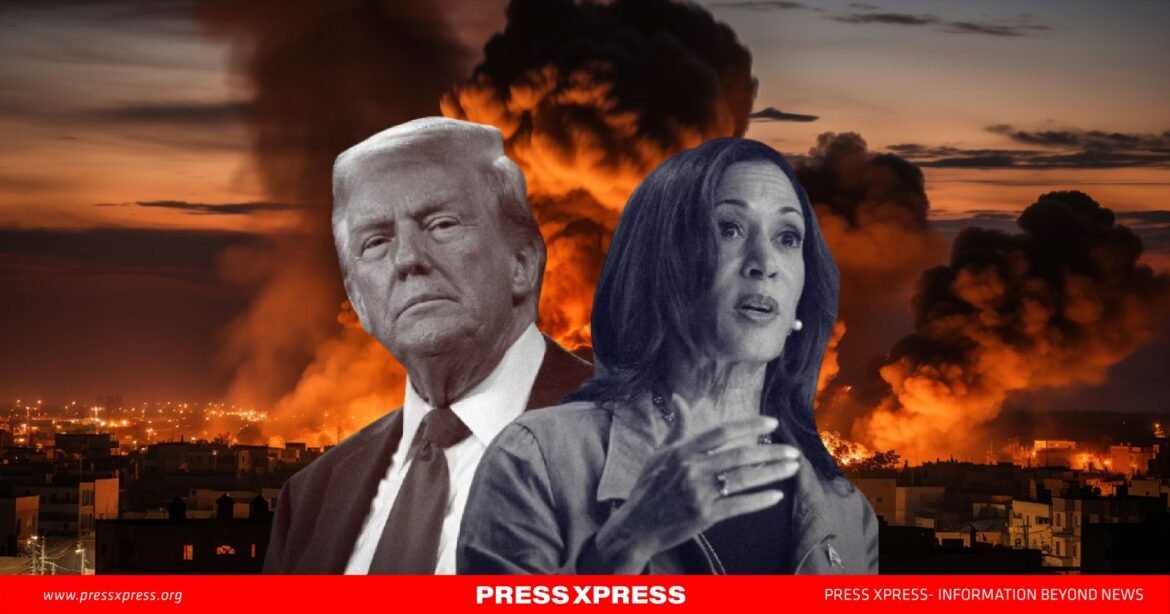Key Highlights:
Trump’s Pro-Israel Stance: Likely to increase military support for Israel, potentially escalating the Israel-Hamas-Hezbollah conflict
Harris’s Diplomatic Approach: Focused on de-escalation, promoting dialogue, and humanitarian efforts, but facing challenges from entrenched regional dynamics
Global Impact: The 2024 U.S. election could significantly influence peace and stability in the Middle East, depending on the chosen foreign policy direction
Two mighty candidates for the US Elections got locked horns over the Middle East policy to draw voters’ attention. The 2024 U.S. election stands to be a pivotal moment, not just for American domestic policy but also for the Middle East, where the Israel-Hamas-Hezbollah conflict continues to destabilize the region. The positions of key candidates like Donald Trump and Kamala Harris on this crisis could play a significant role in shaping future U.S. foreign policy in the region. Both have distinct approaches toward Israel and its regional adversaries, which may either intensify or de-escalate the unrest in the Middle East.
Can the U.S. Election Impact Middle East Unrest? This article delves into Trump and Harris’s visions toward the Israel-Hamas-Hezbollah conflict.
Trump’s Staunch Pro-Israel Stance
Former President Donald Trump’s Middle East policy during his administration was defined by unwavering support for Israel. His recognition of Jerusalem as the capital of Israel, alongside brokering the Abraham Accords, highlighted his efforts to reshape the region’s geopolitical landscape. Trump’s vision was to align Arab nations with Israel against common foes, primarily Iran, Hamas, and Hezbollah. His administration considered Hamas and Hezbollah as major threats to regional peace and supported Israel’s right to defend itself militarily.
Trump’s potential return to the presidency could see a resurgence of these policies. His rhetoric and actions during the current Israel-Hamas conflict suggest that he would adopt a hardline approach, doubling down on military and financial support for Israel. Trump’s past actions have signaled little willingness to engage diplomatically with Hamas or Hezbollah, which he views as proxies of Iran. Instead, his strategy would likely focus on rallying Arab nations like Saudi Arabia to isolate Iran and its affiliated groups.
This could further inflame tensions in the region. While Israel’s military superiority is undisputed, Trump’s aggressive pro-Israel posture might discourage any meaningful diplomatic solutions, exacerbating the conflict with Hamas and Hezbollah. Furthermore, this stance risks alienating the broader Arab population, which remains sympathetic to the Palestinian cause.
Harris’s Diplomatic Approach to Balance U.S. Interests
Vice President Kamala Harris, on the other hand, represents a more nuanced approach to the Israel-Hamas-Hezbollah conflict. Harris has emphasized the need for the U.S. to maintain its strong alliance with Israel but also recognizes the importance of addressing the Palestinian question and supporting humanitarian efforts in Gaza. During the Biden administration, she advocated for de-escalation and for a two-state solution, a policy that the U.S. has historically promoted, albeit with limited success.
Should Harris secure the presidency, her administration might prioritize diplomatic engagement over military interventions. Harris is likely to support Israel’s right to defend itself but may also press for dialogue with moderate Palestinian leaders. While she shares the broader U.S. consensus that Hamas and Hezbollah are terrorist organizations, Harris’s focus may lean towards reducing civilian casualties and pushing for ceasefires or peace talks, possibly working through international channels like the United Nations.
This more restrained approach could ease tensions in the short term, but Harris would face challenges in bringing lasting peace to the region. Hamas and Hezbollah’s entrenched positions and Iran’s influence over these groups present significant obstacles to any diplomatic overtures. However, Harris’s emphasis on multilateralism and conflict resolution might open the door for regional actors like Egypt or Qatar to play a larger role in mediating the conflict.

The Broader Implications of U.S. Leadership
The winner of the U.S. election will have to contend with the shifting dynamics in the Middle East. The region has become more polarized, with Israel’s expanding military campaigns in Gaza, Hezbollah’s potential involvement in Lebanon, and Iran’s support for these groups stirring regional unrest. The U.S. plays a crucial role as a stabilizing force, but its policy choices can either fuel or mitigate the conflict.
Trump’s approach, should he return to power, may embolden Israeli hardliners, increase military engagements, and further isolate the Palestinian factions, particularly Hamas. This could worsen the humanitarian situation in Gaza, leading to widespread condemnation of both Israel and the U.S. in the global arena.
Harris, conversely, might attempt to curb Israel’s military operations while advocating for diplomatic solutions, but such a path risks being perceived as weakness by Israel and its allies. Without strong backing for Israel, there is a chance that the conflict with Hamas and Hezbollah could escalate, as these groups often interpret diplomatic efforts as an opportunity to regroup.
Conclusion
The 2024 U.S. election is poised to have a profound impact on the Middle East, particularly on the Israel-Hamas-Hezbollah conflict. Trump’s likely hardline pro-Israel stance could escalate military tensions, while Harris’s more diplomatic approach could open the door for peace talks but face significant roadblocks. The choice American voters make will not only shape U.S. foreign policy but also have far-reaching consequences for peace and stability in the Middle East.


